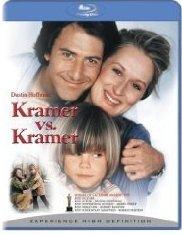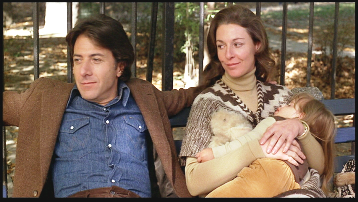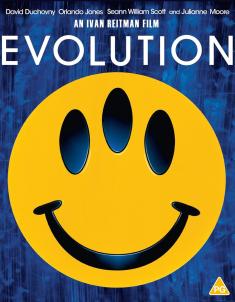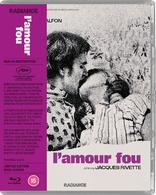Kramer vs. Kramer
Overview -Joanna Kramer, a Manhattan housewife, can no longer face life with her husband Ted. She walks out leaving her son Billy in Ted's charge. Ted has to adjust his life and face up to his new found responsibilities. Just as he starts to find his feet, Joanna returns, intent on fighting for custody of her son. Based on the best-selling novel by Avery Coleman.
Storyline: Our Reviewer's Take

'Kramer vs. Kramer' didn't teach me how to be a dad, but it taught me about the kind of dad I one day wanted to become. One of the first modern films to acutely examine fatherhood from a serious, emotional perspective, this pitch-perfect adaptation of Avery Corman's novel proved men have feelings, too, and can be just as loving, nurturing, and sensitive as women when it comes to being a parent. I was 16 years old when I first saw Robert Benton's film back in 1979, and it had a profound effect on me. It taught me a father didn't have to be a detached, stern workaholic; he could be an active, participatory parent. Heck, he could even be the predominant parent, and completely satisfy his kids' fundamental needs – maybe not in the same way a mother might, but with the same passion, commitment, and tenderness. The role of fathers in our society has certainly evolved in the three decades since 'Kramer vs. Kramer' first premiered, yet any direct correlation between the film and the liberation of American dads is tough to prove. I can only tell you this: Ted Kramer inspired me to stay at home with my kids, put them first before my needs, and cherish every moment with them. And I thank him dearly for it.
Ted (Dustin Hoffman) earns our admiration and respect as the movie progresses, but the qualities that endear him to us certainly don't come hardwired in his psyche. They have to be learned – the hard way – and if his wife, Joanna (Meryl Streep), didn't walk out on him and their young son Billy (Justin Henry), it's doubtful he ever would have discovered the buried sensitivity that ultimately turns him into a great parent. Before his marriage breaks up, Ted is a husband and father in name only, and views his wife and child as little more than an ornamental support system. He works long hours at a major Manhattan advertising firm, schmoozes with his boss, and brings home the bacon while Joanna takes care of the rest. Because he's happy with their respective roles and routines, he assumes she is, too, but living her life as "Ted's wife" and "Billy's mother" stifles Joanna's sense of self, and as the walls of their apartment begin to close in on her, she decides to escape before she goes mad.
So on the very evening Ted lands a big account and craves his wife's fawning admiration, Joanna announces she's leaving. And the next morning, he's reluctantly thrust into a hectic domestic world of which he knows precious little, and forced to care for and forge a relationship with a needy son who's distraught and confused over the sudden loss of his mother. Ted flails about at first, as he tries to meet his mounting deadlines at work and give Billy the undivided support and attention he deserves. The two weather some rough patches (both need to work out their anger and resentment concerning Joanna's departure), but over the course of 18 months, a mutual love and respect develop, and they build a solid, fulfilling life together. Yet the closer they become, the further Ted falls behind the eight ball at the agency, and his golden boy status begins to erode. During this time, he also discovers how to relate to women on a spiritual level through his platonic friendship with his divorced neighbor, Margaret (Jane Alexander). Soon, though, the delicate balance of Ted's world is upset by Joanna's return and her decision to sue for custody, which spawns a bitter court battle.
Few domestic dramas carry the emotional weight of 'Kramer vs. Kramer,' yet the film never feels heavy. Multiple Oscars notwithstanding, it's a small, intimate movie, and Benton (who took home statuettes for direction and adapted screenplay) takes great care to make even the most powerful moments seem real and relatable. Though it would have been easy to craft a black-and-white conflict and present Joanna as a calculating villainess, Benton instead embraces the more challenging shades of gray, and the result is a thought-provoking study of sexual roles and the elusive qualities of responsible parenting. Lesser directors might try to manipulate our emotions or wring false sentiment from the material, but the underrated Benton and his accomplished cast never resort to such cheap tricks. The only scenery chewers are the two attorneys (Howard Duff and George Coe), whose overblown bluster briefly lends the film an unfortunate 'Perry Mason' flavor. Other than that, 'Kramer vs. Kramer' is just about perfect.
Mood is so critical to this film, and Benton plays it just right, occasionally abandoning dialogue to let images speak instead. A wordless scene in which Ted and Billy awaken on a typical morning and go through their normal routine subtly depicts their growing bond, and later on, the simple ritual of making French toast shows how tight and intuitive their relationship has become and how language isn't necessary to convey even the deepest emotions. Benton also uses the fadeout to terrific advantage; almost like a musical coda, the brief bits of black lend many scenes a graceful resonance that's sorely lacking in the frenetic editing of today's films.
The director's work, however, would be hollow without the excellent support of his actors. Hoffman deservedly took home an Oscar for a natural, moving portrayal that's never maudlin. Though he enjoys marvelous moments with Streep and Alexander, he's at his best interacting with Henry, with whom he creates a rare and beautiful chemistry that forms the film's emotional core. Whether he's discussing cartoons with him on the way to school, bawling him out over spilled juice, cradling him in his bed, or delicately explaining a judge's custody decision, Hoffman always strikes the right tone and a universal chord. And so does Henry. Plenty of child actors can bat their eyes, tug on heartstrings, and cry on cue – and they're lauded for it – but Henry gives a real performance, one of the finest in the juvenile field, and he rightfully earned his Best Supporting Actor nomination. (Ironically, one of the youngest nominees lost to one of the oldest; Melvyn Douglas was 70 years Henry's senior.)
'Kramer vs. Kramer' also gave Streep her first Oscar, and she tackles a difficult, ambiguous role with customary aplomb. Though we want to hate Joanna for her selfishness and the pain she inflicts on Ted and especially Billy, Streep won't let us. Yes, Joanna's motivations seem sketchy, but her forthright testimony at the hearing (much of which Streep wrote herself at Benton's request) opens our eyes to her pain and how she felt she acted in her son's best interest. We may not agree with her perspective or approve of what she did, but Streep fleshes Joanna out, and shows how family crises scar everyone involved.
Divorce, abandonment, custody battles, and single parenting are, unfortunately, timeless issues, so 'Kramer vs. Kramer' remains achingly relevant. It's not just the Best Picture of 1979, but a film for the ages – a marvelous, enduring study of parental love, family dynamics, understanding, and forgiveness. It's the type of film that could change you. I know it changed me.
Video Review

The best Blu-ray discs don't just provide superb picture quality, they also present a film's core elements as accurately as possible in an effort to achieve an experience that duplicates the director's intentions. The older the film, the more difficult such a result is to achieve, but 'Kramer vs. Kramer' hits the bull's-eye. Though I can't remember exactly what the film looked like in a theater in 1979, Sony's superb 1080p transfer brought me back to that time and made me feel as if I was watching it on celluloid in my living room. (Yes, the transfer is that good.) The only missing piece was the faint clicking of a projector in the background.
There's not a nick or scratch to be seen on this pristine print, but the cleansing process hasn't disrupted the film's glorious grain structure one iota. Which is not to say the picture looks "grainy"; it doesn't in the least. It looks like film. The image has texture, body, warmth. This is a transfer you can cuddle up to, a transfer that celebrates everything we love about two-dimensional images.
Colors are naturally muted, not faded; much of the film takes place during winter, and gray skies and Big Apple concrete don't offer much in the way of vibrant hues, though a couple of patches of green grass provide some welcome pop. Black levels are inky and dense, especially during the opening scene, and contrast is properly tuned, lending the image nice depth. Though close-ups don't possess the same degree of clarity we might be used to, they still provide excellent detail, and Hoffman's olive complexion and Streep's pale skintones always look natural.
This is an outstanding effort from Sony, one that far outshines the previous standard-def DVD and spotlights Blu-ray's true capabilities. If you think 1080p doesn't do older films any favors, this disc will almost certainly change your viewpoint.
Audio Review

The Dolby TrueHD 5.1 track offers up crystal clear sound, but intimate dialogue scenes don't provide many opportunities for the high-tech audio to shine. That said, I was impressed with what this track was able to accomplish. Most of the sound, of course, is anchored up front, but seamless pans provide natural stereo effects, especially during one scene when Ted's boss is chewing him out. Accents such as footsteps and the clanking of silverware are crisp and distinct, and there's a bit of faint office noise in the rears that adds welcome, periodic atmosphere throughout the film. Best of all, the classical music score really receives a boost; the wonderfully textured guitar duets and selection from Vivaldi's The Four Seasons enjoy fine dynamic range and provide full-bodied surround sound.
TrueHD is also offered in French and Portuguese, and there's a Spanish Dolby Digital 5.1 track as well.
Special Features

There's not much in the way of extras, save for a 2001 documentary ported over from the film's previous DVD release. Perhaps the most interesting "Blu-ray exclusive" on this disc is the awful music that plays over the menus. Maybe Sony couldn't secure the rights to the movie's original classical music, but instead of soothing guitar strains, we get a hyper-dramatic, generic theme that sets the wrong tone.
- Documentary: "Finding the Truth: The Making of 'Kramer vs. Kramer'" (SD, 49 minutes) – All the principals – Hoffman, Streep, Henry, Benton, and Alexander, as well as producer Stanley R. Jaffe and novelist Avery Corman – participate in this probing, interesting documentary that focuses on the creative team's strong commitment to the project and the collaborative effort that brought it to the screen. Surprisingly, Hoffman admits he didn't want to do the film at first; he was embroiled in his own divorce and thought it would be "too painful." He also opposed the casting of Henry as Billy, believing his mop-top look was "too cute." (Luckily, he acquiesced on both counts.) Hoffman also dissects the famous ice cream scene, which was not in the original script, while Streep speaks glowingly of Benton's generosity and willingness to receive input from the cast – a refreshing change from the more rigid on-set atmosphere of Woody Allen's 'Manhattan,' which she shot concurrently. Tastefully produced and filled with insight and anecdotes, this is an essential documentary that adds a lot to the film.
If it's been a while since you've seen 'Kramer vs. Kramer,' it's time for a return visit. And if you've never experienced this Best Picture winner, shame on you for letting it slip under your radar. Either way, the release of this high quality Blu-ray disc provides a perfect excuse to examine Robert Benton's wrenching drama, which plays just as well as it did 30 years ago and addresses issues and themes we're still grappling with today. Of course, watching Hoffman and Streep never gets old, and thanks to the exceptional video transfer (which should stand as a reference for films from this period), they both look terrific. Without question, this is one to own.











